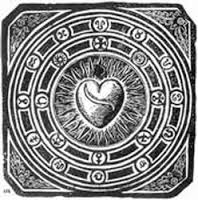Os dois “Ais” do logion sugerem a mesma resposta: é necessário que a carne e a alma não tenham mútua dependência uma da outra.
É verdade que a carne quando está só, não tem tendências, nem tentações, porque não vêm da carne mas da alma; e também é verdade que a alma quando não trabalha sobre a carne não produz frutos de morte, porque não são dela, mas engendrados por seu viver na carne.
A dificuldade sobrevém quando a consciência do homem planeia sobre sua carne ao invés de descansar sob o espírito. Então a alma troca em paixão seu viver harmonioso e a carne se enche de tendência até a morte, que não são suas.
Isso é o que queria dizer Jesus quando na hora de sua agonia pedia a seus discípulos: “Vigiai e orai para que não caias em tentação; que o espírito está pronto, mas a carne é débil”.
Colocada a alma ente a resposta pronta do espírito e a debilidade que confere a carne, o estar alerta, vigilante, em adoração da “presença” invisível, garante não só a resposta do espírito, senão não queda na dependência da carne.
Para a alma que vive segundo a carne, o espírito parece se alijar até restar convertido em somente o nome de um vento que não existe, que não sopra nunca sobre a alma; e a carne, vem a ser uma fogueira onde se incendeiam por si só as paixões.
Isto é algo muito simples, mas resulta bastante afastado das postulações do viver de hoje, e talvez convenha olhar os fatores de interdependência da carne e da alma sobre os que funda seus “ais” o logion. (vide epithymetikon).
Ce logion rejoint le log. 87. Il envisage la situation de l’homme divisé dont l’âme est en contradiction avec le corps. Les exigences de celui-ci se situent dans l’ordre naturel qui peut être perturbé en profondeur lorsque les prétentions de l’âme ne lui permettent pas de s’exprimer normalement. Mais la réciproque est vraie également : les aspirations de l’âme peuvent être contrecarrées par la tyrannie d’un corps qui ne recherche que la satisfaction immédiate.
- A carne livre da psyche é esta maravilha das maravilhas de que fala Jesus no Logion 29, pois ela se tornou ocasião do Espírito.
- A psyche dominada pela carne, requer a renúncia demandada no breve8922
La chair délice de la psyché (âme) est cette merveille de merveille dont a parlé Jésus (log. 29), car elle est devenue l’occasion de l’Esprit. En revanche, la chair assujettie à la psyché est dans la misère.
La réciproque est vraie également. La psyché qui vit sous l’emprise des désirs de la chair n’est pas dans les dispositions voulues pour lâcher prise. Il lui faut connaître les compensations sécurisantes dont elle a besoin ; cependant vient le moment où elle doit consentir à se démettre : « Celui qui a trouvé le monde… qu’il renonce au monde » (log. 110).
Sayings 87 and 112 constitute one of the five pairs of doublets in the Gospel of Thomas; they resemble each other lexically, structurally, and conceptually. On the other hand, there are notable differences between these two sayings. Most remarkably, saying 112 has no parallel for the notion of the body that depends on another body in saying 87. Scholars have offered several different interpretations for these two “bodies.” For instance, according to Uro, since the world, according to sayings 56 and 80, is a body, the body on which the other body depends is the world. As insightful as it is, this interpretation appears to be problematic from a strictly grammatical perspective: in all likelihood, the fact that the indefinite article ογ precedes the word [palavra em copto], indicates that, in the Greek Vorlage of Gos. Thom. 87:1, the word σώμα was anarthrous. Thus, according to Gos. Thom. 87a, every single body that depends on another body is wretched.
The principle described in Gos. Thom. 87:1 is, therefore, universal. While it is applicable to an individual body that is dependent upon the world, it is also applicable to the human body, “which depends for sustenance on the devouring of corpses,” to the lover who depends on the object of his desire, to the slave who depends on his master, and so on. There can be little doubt that saying 87 is intentionally formulated in such a universalistic and abstract fashion that any of the aforementioned interpretations would do it justice. What is important, however, is that the discussion of the bodies in Gos. Thom. 87:1 lays the groundwork for the description of the misfortunes of the embodied soul in Gos. Thom. 87:2. The ultimate point of saying 87 is the following: every single body that is dependent upon another body is wretched, but the soul that is dependent upon a body, which is itself dependent upon another body is doubly wretched.
It is also worth noting that, while saying 87 contrasts the body with the soul, saying 112 contrasts the soul with the flesh. Although some early Christian texts [74] certainly make a distinction between the flesh and the body, the fact that sayings 87 and 112 constitute a doublet makes it likely that, in these two sayings, the terms [palavras em copto] are, in fact, synonyms. Moreover, in Gos. Thom. 29:1-2 (quoted above, PP. 71-72), these two terms also appear to be synonymous. Thus, it follows that the Gospel of Thomas uses the terms “body” and “flesh” interchangeably.
